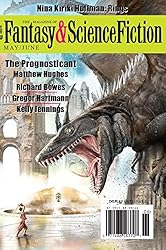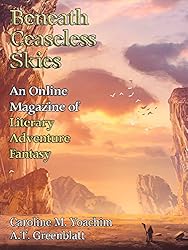Our weekly exploration of free and inexpensive short fiction available on the internet. Here are a few excellent stories, including three more from the current crop of Nebula and Hugo award nominees.

![]() Dirty Old Town by Richard Bowes (2017, Fantasy & Science Fiction magazine, May/June 2017 issue; PDF is temporarily free here, courtesy of F&SF). 2018 Nebula award nominee (novelette)
Dirty Old Town by Richard Bowes (2017, Fantasy & Science Fiction magazine, May/June 2017 issue; PDF is temporarily free here, courtesy of F&SF). 2018 Nebula award nominee (novelette)
Richard Bowes is no stranger to semi-autobiographical work. He returns to that form here in his novelette Dirty Old Town, a Nebula award nominee.
Through a series of dreams and stories, the narrator (we’ll call him Richard), now an author, talks us through his childhood in South Boston during the 1950s. In particular, he reminisces about his Irish grandparents and a boy, Eddie Mackey, who used to bully him.
One St Patrick’s Day the young Richard explains to his grandmother that Eddie “gives me bad dreams” ― indeed, the opening passage of the story is a dream that the adult Eddie has supposedly planted in Richard’s head. We later learn that Eddie is from a “magic line.” In response to Eddie’s provocations, Richard’s grandmother teaches him an invocation that he can use to protect himself. He uses this to great effect against his tormentors. Richard eventually moves out of Boston but he and Eddie meet again on several occasions, briefly as lovers, and eventually as relations.
Dirty Old Town is what I would call a “quiet fantasy” in that the magical elements do not take centre stage, but rather supplement a different kind of story ― one of childhood memories, family and nostalgia. Nor is it dramatic. It’s a subtle story about two lives, inextricably linked by a bit of magic.
Although not as memorable as some of Bowes’ other work (I’m thinking of the short story “There’s a Hole in the City”) I enjoyed the simple way Dirty Old Town captures a life lived in a certain place, at a certain time, and the sense of gentle nostalgia it garners. Richard Bowes is a great writer, his style is crystal clear, never flowery but always observant, and here he uses that style to evoke the streets of his youth and the story of one unusual friendship. ~Katie Burton
![]() Children of Thorns, Children of Water by Aliette de Bodard (2017, free at Uncanny, July-August 2017, $3.99 Kindle magazine issue). 2017 Hugo award nominee (novelette)
Children of Thorns, Children of Water by Aliette de Bodard (2017, free at Uncanny, July-August 2017, $3.99 Kindle magazine issue). 2017 Hugo award nominee (novelette)
This novelette is set in the same world as de Bodard’s 2015 novel The House of Shattered Wings, an alternative history type of novel set in the late 20th century in Paris, which lies in ruins in the aftermath of a magical conflict called the Great War. Helpful background for those who haven’t read that novel: Paris is inhabited by both humans and fallen angels, whose bodies carry magic that can be distilled used by other angels and humans. Great Houses, largely under the leadership of the fallen angels, vie for control and influence. Underneath the Seine River is the “dragon kingdom,” a hidden magical kingdom of Vietnamese who can shapeshift into Asian dragons, as well as sense and control the magical energy currents of khi (the Vietnamese equivalent of the Chinese chi).
Kim Cuc and Thuan have come from the dragon kingdom on a mission: House Hawthorn is having its annual hiring day for those who are Houseless to apply to become servants and House dependents. Hawthorn is the closest House to the dragon kingdom, and recently this House has begun encroaching on dragon territory under the Seine, for no known reason. If Kim Cuc and Thuan are successful at being hired by Hawthorn, they’ll be in a position to spy on Hawthorn’s doings.
All starts out well: they are placed in a group of three with Leila, a young girl of Maghrebi descent, and assigned to bake or create something “impressive” within an hour. Luckily Thuan has some skill in this area (Kim Cuc comments that he was “paying way too much attention to old recipes, back when he was trying to seduce the family cook”) and chocolate éclairs are well underway when the trio is suddenly interrupted. Some kind of emergency requires a hasty evacuation of the Hawthorn mansion … but will they all make it out?
The clash between different types of magic and cultures works well here, and the characters are well-developed enough, with a few quirks, to be memorable. The worldbuilding in Children of Thorns, Children of Water is rich and imaginative, though a little difficult to absorb if you aren’t familiar with that world from The House of Shattered Wings. I was floundering just a little during my first read of this novelette, which is set in between Shattered Wings and its sequel, The House of Binding Thorns. But reading the FanLit review for Shattered Wings was enough to give me my sea legs in this world, and the story made more sense and was more impactful when I reread it with this background knowledge. Though it interlocks with de Bodard’s novels in her DOMINION OF THE FALLEN series, Children of Thorns, Children of Water actually works nicely as a stand-alone story. ~Tadiana Jones
![]() “Our King and His Court” by Rich Larson (2018, free at Tor.com, 99c Kindle version)
“Our King and His Court” by Rich Larson (2018, free at Tor.com, 99c Kindle version)
“Our King and His Court” is a bleak and horrific but engrossing short story set in post-apocalyptic Mexico. Scipio, a trusted soldier in the brutal criminal gang run by El Tirano (the Tyrant), has just rescued his boss’s young son Mateo from kidnappers who have left the boy with physical and emotional scars. Now he’s returning Mateo to the arms of his father, El Tirano … but there’s more going on here than initially meets the eye. The story pauses for four flashbacks ― Scipio’s meetings with a courtesan, a padre, and other members of El Tirono’s gang ― that gradually shed light on Scipio’s world and the decision he has to make.
The setting is rich with details, especially El Tirano’s throne room, with his chair inside the skeleton of a dinosaur, rotting corpses of his enemies dangling from the skeleton (the bodies are coated in a bacterial film to block their stench), surrounded by drug-dazed girls masked in Day of the Dead makeup. The story also weaves in some fascinating advances in medical technology that both spice up this tale and are necessary elements of the plot. “Our King and His Court” effectively builds toward a surprising, almost shocking, ending. ~Tadiana Jones
![]() “Carnival Nine” by Caroline M. Yoachim (2017, free at Beneath Ceaseless Skies, 99c Kindle magazine issue). 2018 Nebula and 2017 Hugo award nominee (short story)
“Carnival Nine” by Caroline M. Yoachim (2017, free at Beneath Ceaseless Skies, 99c Kindle magazine issue). 2018 Nebula and 2017 Hugo award nominee (short story)
Zee lives in a world inhabited entirely by doll-like wind-up people and animals. They have a mysterious, unseen maker who winds their mainspring each night using the key attached to their backs, giving them energy for the next day. Everyone gets approximately a thousand days of life before their mainspring can’t be wound anymore and their parts are then recycled. Zee is lucky: she has a stronger mainspring than most people, which gives her extra “turns” or energy each day.
Zee and her Papa live a quiet life in Closet City, making clothing out of scraps of cloth dropped by the maker, and taking care of her Granny and Gramps, whose springs are winding down. So on the day Carnival Nine comes to town on the train, Zee plays hooky from her chores and runs off to see the carnival. There she meets a carny boy named Vale, who shows her around. Eventually Zee leaves her home to make a life, and then a child, with Vale. Literally “make”: they go to the part of the train where extra parts are stored and assemble their child Mattan, then wait overnight for the maker to give him his mainspring and life. But there’s a problem:
The maker gave me forty-three turns the day that I met my child. My darling Mattan got only four. Something was wrong with his mainspring. I was definitely no mechanic, but I could hear it, a strained and creaking noise like metal bending to its breaking point. What could you do with four turns? How could I teach him the world if that was all he had to work with?
“Carnival Nine” is an extended metaphor, primarily about caring for others who have special needs, but also about life, caring for others and sharing burdens. This toys-as-humans metaphor reminded me of Max Lucado’s inspirational children’s book, You are Special, though the religious element (if one acknowledges “the maker” as a God figure) is far subtler. The metaphor is straightforward, perhaps a little simplistic, but touching nevertheless. The plot is secondary; this is more the story of one woman’s life and her loves and choices.
There are some charming details to this world, like the traditional 200th day of life when a person’s child-sized limbs are swapped out for adult-size ones (which they help choose), and the train carrying Carnival Nine being described as traveling a circuit “from the Attic City to the brightly painted Children’s Room and down the long hallway to Closet City.” It’s a quiet, contemplative tale with a slightly nostalgic feel. ~Tadiana Jones







Do it! One of the best things I've read in recent years.
This reminds me. I want to read Addie LaRue.
We’re in total agreement David!
I felt just the same. The prose and character work was excellent. The larger story was unsatisfying, especially compared to…
Hmmm. I think I'll pass.